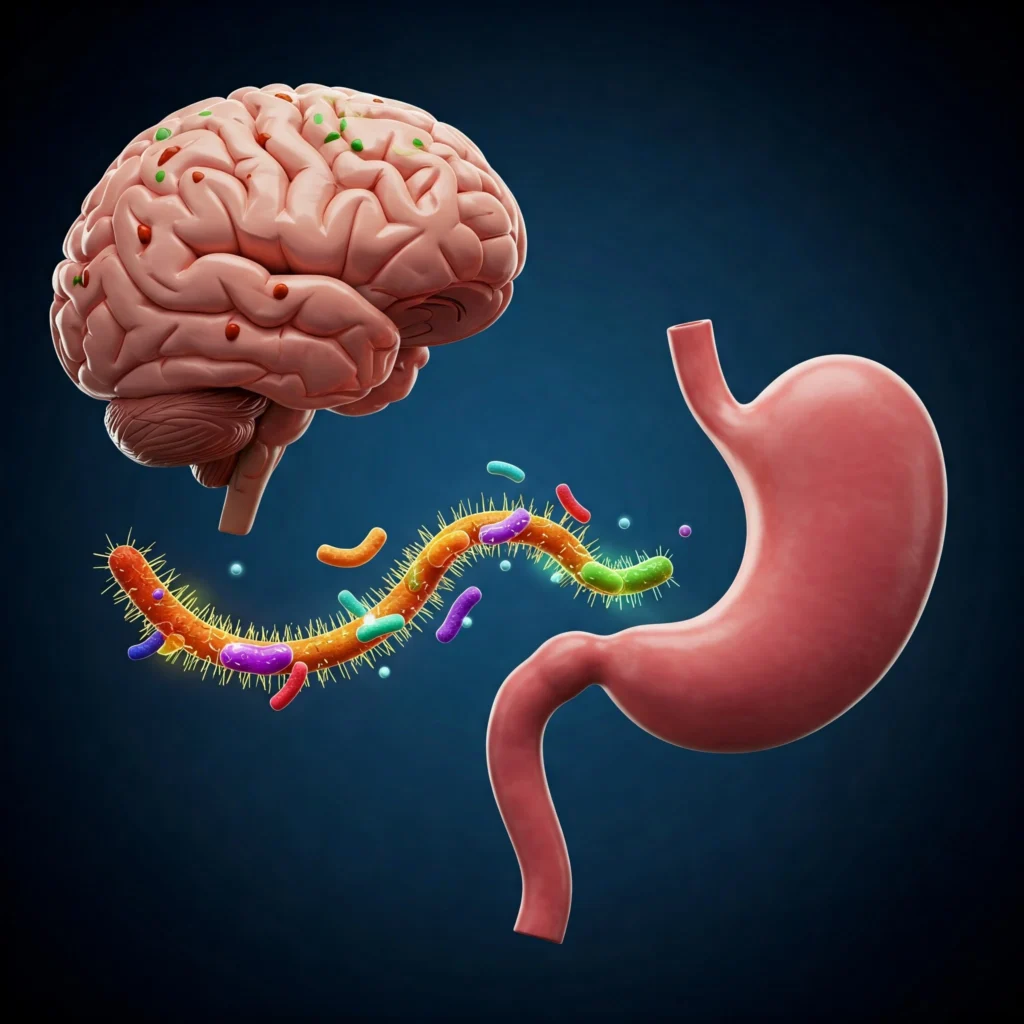Table of Contents
The Gut-Brain Connection: How Your Gut Bacteria Impacts Mental Health

The human gut, once considered merely a digestive organ, is now recognized as a complex and dynamic ecosystem teeming with trillions of microorganisms. This intricate community, collectively known as the gut bacteria, plays a pivotal role in various bodily functions, extending far beyond digestion. Emerging research has unveiled a fascinating two-way communication highway between the gut and the brain, highlighting a profound influence of the gut bacteria on mental health.
Understanding the Gut-Brain Axis:
The intricate relationship between the gut and the brain is often referred to as the “gut-brain axis.” This complex bidirectional communication network involves various pathways:
- The Vagus Nerve: This crucial nerve connects the gut to the brain, transmitting signals between them. It plays a significant role in regulating gut motility, immune responses, and even emotional states.
- The Immune System: The gut houses a significant portion of the immune system. Imbalances in the gut microbiome can trigger inflammation, which can, in turn, affect brain function and contribute to mental health issues.
- The Endocrine System: The gut produces and releases various hormones, including serotonin, which plays a crucial role in mood regulation. The gut bacteria can influence the production and release of these hormones.
- The Neurotransmitter System: Gut bacteria can synthesize and metabolize neurotransmitters, such as dopamine, gamma-aminobutyric acid (GABA), and serotonin, which are essential for regulating mood, anxiety, and cognitive function.
The Impact of the Microbiome on Mental Health:
A growing body of evidence suggests a strong link between the gut bacteria and mental health conditions, including:
- Anxiety and Depression: Studies have shown that individuals with anxiety and depression often exhibit altered gut microbiota composition compared to healthy individuals. Dysbiosis, an imbalance in the gut bacteria, can lead to increased inflammation and altered brain chemistry, contributing to the development and exacerbation of these conditions.
- For example: Certain strains of gut bacteria produce short-chain fatty acids (SCFAs), which have anti-inflammatory properties and can positively influence brain function. A deficiency in these beneficial bacteria may contribute to increased inflammation and an elevated risk of depression.
- Neurodegenerative Diseases: Emerging research suggests a potential link between gut bacteria imbalances and neurodegenerative diseases such as Parkinson’s and Alzheimer’s. Dysbiosis may contribute to neuroinflammation and the accumulation of harmful proteins in the brain.
- Autism Spectrum Disorder (ASD): Studies have observed differences in the gut microbiota composition of individuals with ASD compared to those without. These differences may contribute to gastrointestinal issues and behavioral challenges often associated with ASD.
Factors Influencing the Gut Bacteria:
Several factors can significantly impact the composition and diversity of the gut microbiome:
- Diet: A diet rich in processed foods, high in sugar and saturated fat, and low in fiber can disrupt the balance of gut bacteria. Conversely, a diet rich in fruits, vegetables, whole grains, and fermented foods can promote a diverse and healthy microbiome.
- Antibiotics: While crucial for treating infections, antibiotics can indiscriminately kill both harmful and beneficial bacteria, leading to dysbiosis.
- Stress: Chronic stress can negatively impact the gut microbiome by altering gut motility and immune function.
- Lifestyle Factors: Factors such as sleep quality, exercise, and alcohol consumption can also influence the gut microbiome.
Nurturing a Healthy Gut Microbiome:
Several strategies can help to nurture a healthy gut microbiome and potentially improve mental well-being:

- Dietary Interventions:
- Increase intake of prebiotic foods: These foods, such as fruits, vegetables, and whole grains, provide nourishment for beneficial bacteria.
- Consume probiotic foods: Yogurt, kefir, and fermented vegetables are rich sources of probiotics, which introduce beneficial bacteria into the gut.
- Consider a plant-based diet: A plant-based diet is rich in fiber and antioxidants, both of which support a healthy gut microbiome.
- Lifestyle Modifications:
- Manage stress levels: Practice stress-reducing techniques such as mindfulness, yoga, and deep breathing exercises.
- Prioritize sleep: Aim for 7-9 hours of quality sleep per night.
- Engage in regular physical activity: Exercise can promote gut motility and improve overall gut health.
- Consider Probiotic Supplements: Probiotic supplements can introduce beneficial bacteria into the gut, but it’s essential to choose high-quality supplements and consult with a healthcare professional before starting any supplementation.
Frequently Asked Questions (FAQs):
1. Can I test my gut microbiome?
Ans. The answer is Yes, you can have your gut microbiome tested through a stool sample. These tests can provide insights into the composition and diversity of your gut bacteria. However, it’s important to consult with a healthcare professional to discuss the implications of the results and appropriate next steps.
2. Can improving gut health cure mental health conditions?
Ans. While a healthy gut microbiome can contribute to improved mental well-being, it’s crucial to understand that it’s not a cure-all for mental health conditions.
For individuals with anxiety, depression, or other mental health concerns, addressing gut health may be a supportive component of a comprehensive treatment plan that includes therapy, medication, and lifestyle modifications.
3. Can probiotics help with anxiety and depression?
Ans. Some research suggests that certain probiotic strains may have beneficial effects on mood and anxiety. However, more research is needed to fully understand the role of probiotics in mental health. It’s important to consult with a healthcare professional or a registered dietitian before starting any probiotic supplementation.
4. What are the potential risks of manipulating the gut microbiome?
Ans. While generally safe, there are potential risks associated with manipulating the gut microbiome, such as: Interactions with medications: Probiotics may interact with certain medications, so it’s important to consult with a healthcare professional before starting any supplementation.
Unintended side effects: Some individuals may experience side effects such as gas, bloating, or diarrhea when taking probiotics.
5. What is the future of gut-brain research?
Ans. Research on the gut-brain axis is rapidly evolving. Future research may focus on developing personalized probiotic therapies for mental health conditions, exploring the role of the gut microbiome in neurodegenerative diseases, and investigating the potential of fecal microbiota transplantation (FMT) for treating mental health disorders.
Conclusion:
The emerging field of gut-brain research has revolutionized our understanding of the intricate connection between the gut and the brain. By nurturing a healthy gut microbiome through dietary interventions, lifestyle modifications, and potentially probiotic supplementation, we may be able to support optimal mental health and well-being.
Note: This content is for informational purposes only and should not be considered medical advice.
Disclaimer:
This article is for informational purposes only. The information presented may not be suitable for everyone and should not be considered medical advice. Always Consult a qualified healthcare professional before making any decisions based on this content.
Further Readings:
- NIH Study on Gut-Brain Axis and Depression
- Nature Article: Stress Resilience and Gut-Brain Interactions
- JAMA Psychiatry Review on Gut Microbiota in Psychiatric Disorders
- HealthCentral Article on Gut Health and Mental Health
Please note: These links are provided for informational purposes only and do not constitute medical advice.



